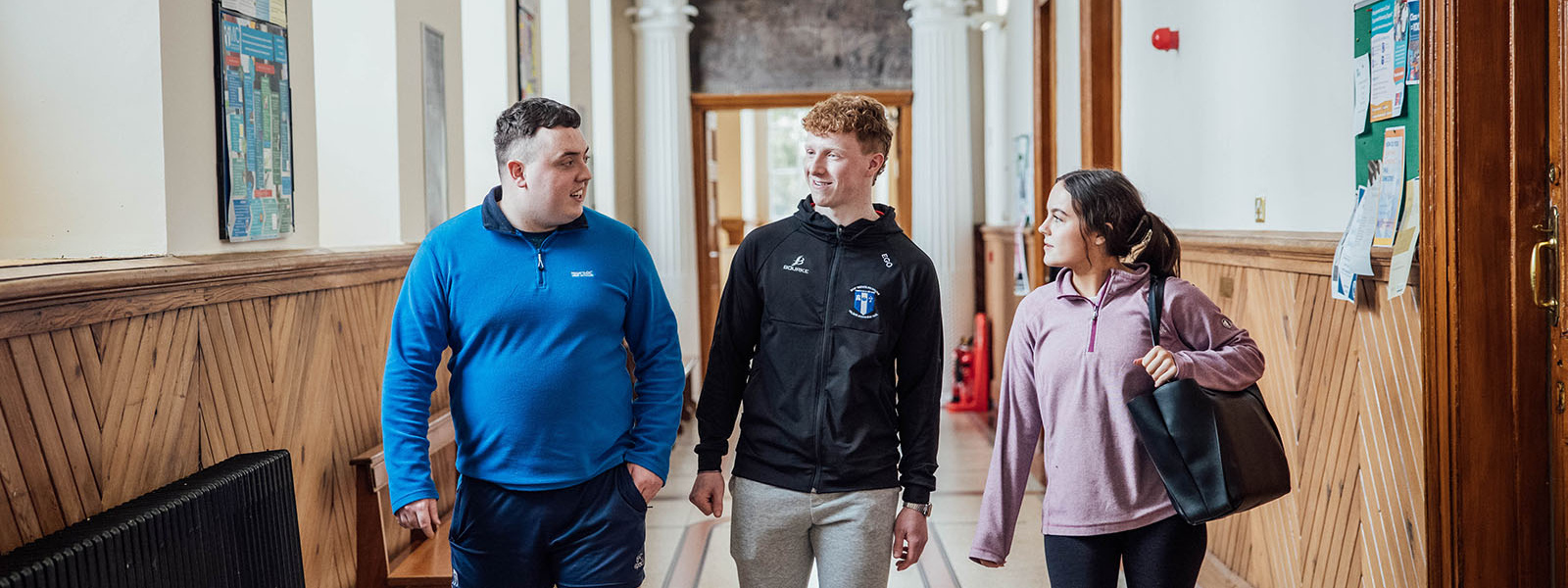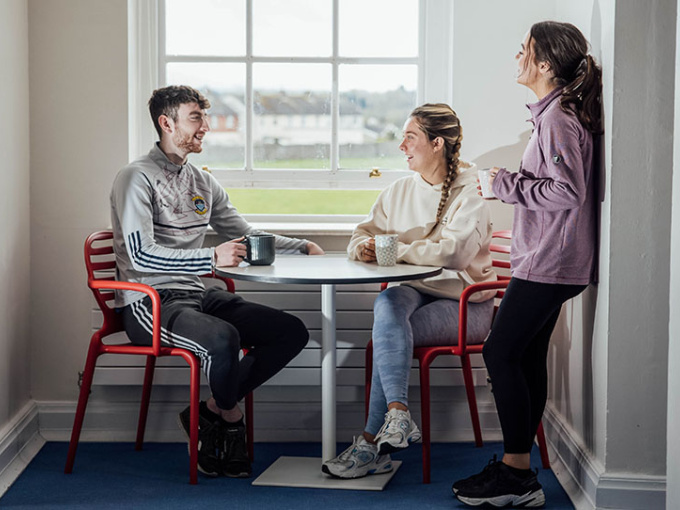BA in Education, Mathematics & Gaeilge (MI020)
CAO Points 2024: 476
Duration : 4 years full-time
Places Offered: Up to 30
Location: MIC Thurles
Lecture Hours: 11-12 approx.
Tutorial Hours: 5 approx.
Assessment:
Mixed but may include presentations, essays and exams.
- Programme Overview
- Programme Content
- Entry Requirements
- Ask a Question
Programme Overview
The BA in Education, Mathematics and Gaeilge programme (post-primary) is a four-year, full-time, undergraduate concurrent teacher education degree (Level 8), currently offered at MIC Thurles. Graduates are qualified to teach Gaeilge and Mathematics to honours Leaving Certificate level.

Why study on this programme?
Graduates of the programme will:
- Demonstrate subject knowledge, knowledge of curriculum content and process and professional knowledge
- Engage in critical and analytical thinking, problem-solving, reflection and self-evaluation
- Engage in planning, teaching, learning, assessment, classroom management and organisation for the classroom and the school as a learning organisation
- Articulate a commitment to and vision for the development of the uniqueness of the pupil in all his/her dimensions
- Integrate and apply knowledge skills, attitudes and values in complex and unpredictable educational settings
- Exhibit strong interpersonal skill and a readiness to be leaders and innovators of curriculum change
- Demonstrate a commitment to lifelong personal and professional development and actively participate in professional learning communities
Modules & Study Abroad
Students are educated in the most current methodologies and technologies available to enhance the teaching of their subject areas at post-primary level. The degree programme includes four years of modules in Gaeilge and Mathematics. These are taken concurrently with education modules which include theoretical, pedagogical and professional studies along with a number of school placement experiences. The Teaching Council requires Irish language teachers to have spent a minimum of four weeks in a designated Gaeltacht area prior to registering with it. This requirement is fulfilled in the form of two compulsory Cúrsa Gaeltachta each of two weeks duration which is organised by the College. The Cúrsaí Gaeltachta are a programme requirement as each Cúrsa forms the basis of a module of the programme.
Study Abroad Options
Opportunities to travel to the USA and Japan for short-stay school placements are available in Year 3. Semester 6 offers opportunities to study abroad including Australia. Our relationships with post-primary schools in Australia also extend to being placed in these schools in the summer of Year 4.
School Placement
The school placement element of the programme is designed to meet the Teaching Council’s requirements, and students will spend approximately 23 weeks in schools during the programme. This period will allow students to engage in observation, class-based and whole-school teaching and learning activities. Working in partnership with schools, the placements are designed to enable students experience class levels from junior to senior cycle within a range of school types, and that the student is guided and empowered along his/her learning-to-teach journey. The level and range of teaching and learning activities increases from School Placement 1 to School Placement 3 and the student is assisted by the tutors and co-operating teachers to ensure that her/his practice is reflective of professional knowledge and her/his own personal commitment to the pupils’ wellbeing and learning. There is an integrated focus on subject knowledge and also inclusion and differentiation for each placement. Placements occur at four points in the programme.
- Teaching and Learning 1 - Year 1, Semester 2: Students are given the opportunity to observe for one week in a senior primary classroom. This observation placement provides an opportunity for students to gain an insight into the interconnection between primary and post-primary education. The placement inducts student teachers into the practice of teaching and reflection.
- School Placement 1 - Year 2, Semester 4: The focus for this six-week School Placement is on lesson planning and preparation, scheme planning and developing effective teaching strategies in their subject areas. There is also a strong emphasis on the development of critical and reflective practice, and on developing an understanding of schools as organisations. Both observation and teaching elements are integrated into this placement which is located at Junior Cycle level and /or Transition Year level. Students may also be placed in pairs on this placement, facilitating team teaching with one another as well as with established teachers.
- School Placement 2 - Year 3, Semester 6: In this two week placement, students will work in special settings including the possibility of an international placement. The purpose of this placement is to support the student in becoming an inclusive teacher and to develop their confidence and competence in responding to diverse needs in the classroom.
- School Placement 3 This placement will run over 14 weeks. In School Placement 3, the student teachers will plan, prepare and implement schemes of work and lesson plans in their subject areas at Junior and Senior Cycle level. There will be a strong emphasis on reflective practice throughout these modules.

Gaeltacht Courses / Cúrsaí Gaeltachta
Tabharfaidh mic léinn faoi dhá Chúrsa Gaeltachta coicíse le linn chlár na céime. De ghnáth, beidh na Cúrsaí sin le déanamh ag deireadh Bhliain 1 agus ag deireadh Bhliain 3. Modúil riachtanacha den chlár céime is ea na Cúrsaí Gaeltachta. Déanfaidh mic léinn an dá chúrsa sin i gceantair Ghaeltachta éagsúla chun taithí a fháil ar dhá cheann de phríomhchanúintí na Gaeilge.
Trí thumadh sa Ghaeilge tá sé d’aidhm ag na Cúrsaí Gaeltachta:
Cur le heolas agus le tuiscint an mhic léinn ar shaol agus ar shaíocht na Gaeltachta;
Cur le cumas cumarsáide an mhic léinn tríd an nGaeilge a úsáid mar theanga bheo. Déanfar tástáil ar an gcumas sin trí thagairt do thorthaí foghlama na modúl;
Taithí thaitneamhach a bheith ag an mac léinn le tógáil ar an ngrá atá aige/aici don Ghaeilge mar theanga agus a m(h)uinín i labhairt na Gaeilge a threisiú.
Undergraduate Dissertation
This programme places great emphasis on teaching and research. As part of their development as research-active teachers, students undertake an Undergraduate Dissertation. The dissertation can be in either education or a subject discipline. Students begin the preparation for the dissertation in Year 3 where they undertake their research methods module.
Career Opportunities
The programme prepares graduates for their roles in all areas of professional life in education.
The following list demonstrates just some of the careers opportunities for graduates:
- Post-primary teacher
- Irish Language Media
- Irish Language Promotion
- Translation
- Civil Service
- Financial
- Information Technology
Undergraduate Entrance Scholarships
Each year, Mary Immaculate College awards up to 50 Undergraduate Entrance Scholarships across all undergraduate programmes valued at €2,000 each, on the basis of results obtained in the Irish Leaving Certificate Examination.
Further information about Undergraduate Entrance Scholarships available here.
- Programme Overview
- Programme Content
- Entry Requirements
- Ask a Question



